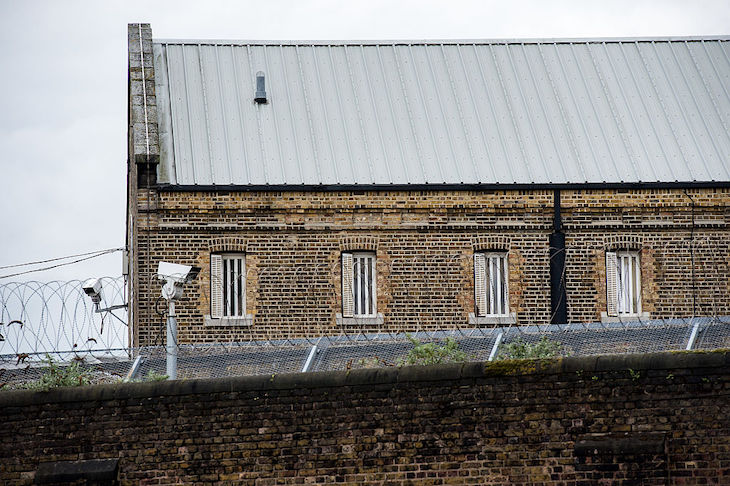On my first night in prison, I slept well. Perhaps the previous day’s stress and exhaustion played a part. Neither the thin rubber mattress, scratchy orange nylon blanket nor my feet hanging off the end of the bed stopped me falling into a deep sleep. Banging and shouting from other cells woke me a couple of times, but I soon slept again.
When I woke, I felt surprisingly calm. My cellmate in HMP Wandsworth, Peter, seemed fine: stable, calm, not on drugs. And the bad thing I’d dreaded for years had finally happened. Here, imprisoned – sentenced to 45 months for fraud – I no longer had to torture myself with those fears.
I looked about the cell. No kettle or TV. Two pieces of paper on the floor, just by the door. I climbed down and picked them up. The printed slips informed me that I must attend an ‘Induction Presentation and Education Assessment’ that morning and provided directions to the relevant rooms.
Even in prison there’s no escape from bad Powerpoint presentations
Thumping footsteps, punctuated by the sound of large metal keys turning heavy locks. Happy voices of men released onto the wing. Our door opened. Before the officer turned to the next door I asked him: ‘Excuse me sir, could we get a TV?’
‘I’ll see what I can do,’ he muttered as he walked on.
We were supposed to get an hour of ‘social and domestic’ time each morning. Prisoners gathered in small groups or strode about hurrying to complete errands. Unfortunately that day’s S&Ds overlapped with my induction, so I walked up two flights of stairs to the ‘4s’ and found the room.
Bigger than the cells. Posters on the walls. Messages about drug safety, hepatitis, and warnings about the penalties for drugs, phones and weapons. Plastic chairs for us to sit on. A projector, desk and board at the front. Almost like a classroom, except for the bars on the windows.
Even in prison there’s no escape from bad Powerpoint presentations. Wandsworth’s ‘induction’ presentation is amongst the worst I’ve ever endured. I sat there, with half a dozen other men while an officer slowly read each slide out to us. I learned little about how the prison worked. The presentation focused on telling us not to be violent, racist, homophobic or handle contraband. In the months ahead, I would learn how Wandsworth really operated, from experience and talking to other prisoners.
When the presentation finally finished, I walked to the education assessment room. I’d missed my appointment. The cramped space reminded me of a school computer room. Machines packed tight. Men, ranging in age from their twenties to their fifties, sat in front of all of the computers. At one end of the room stood a middle-aged woman with loose curls. I walked up to her.
‘Sorry, I’m late for my assessment. My induction only just finished.’ I handed her the slip.
She replied in a soft French accent. ‘Hello David, I’m Marianne. That’s okay. Fill in this form. You’ll have to wait a bit.’
The bad thing I’d dreaded for years had finally happened
While I struggled to remember my GCSE grades from twenty years before, I listened to the other prisoners. Many had such limited literacy that they couldn’t understand the instructions for the English and maths assessments they had been asked to complete and kept asking Marianne to help them.
I’d known, in a theoretical, abstract way, how poor our functional literacy levels are in Britain. But I’d never been confronted with this reality before. What legitimate employment opportunities exist for someone who can’t read? Not for the last time I thought that many people in prison had far more excuse than me for being there.
When I completed my form there still weren’t any computers free so I spoke with Marianne. I asked about the possibility of studying writing. She explained that the creative writing classes had ceased, due to budget cuts, but I might be able to do something with the Open University.
After a while, with all the computers still in use, Marianne looked over my form: ‘You don’t need to do these tests. I’ll just mark you down as being the highest level.’
This meant I’d be able to apply for any prison job, even in the library.
I walked back to my cell. Almost all the doors stood closed. S&Ds had ended. A guard unlocked my door, revealing a delighted Peter. I stepped inside, and the door banged shut behind me.
‘Look! They brought us a TV. I think it’s because you’re English.’
‘What do you mean?’
‘I’ve been asking for a TV for days. Nothing. Then you ask this morning, and he brought it straight away. There’s one problem though.’
‘What’s that?’
Peter laughed. ‘No aerial!’
A TV, but no way of connecting it to the aerial socket. ‘Did you ask if they have any?’
‘Yes, they said none spare.’
I looked around the cell. We must have something. I pointed at an empty carton of UHT milk in the bin.
‘Does that have foil on the inside?’
‘I think so. You think that will work?’
We rinsed the carton out in the metal sink then tore it open. I peeled out the foil lining and rolled it into a short, thin tube with which I connected the TV to the aerial socket. It worked! We had TV. Fuzzy, grainy, bad analogue TV from the 90s, but we felt wonderful. I’d already realised that prisoners have almost no control over their lives. Perhaps that’s why this simple act of doing something for ourselves made us so happy.
That night, and for much of the next day, we watched TV. Our ‘dinner’, collected from the servery hatch around 4pm, and eaten in our cell was a slice of doughy pizza. Not terrible. Then the Six Nations. Peter had never watched rugby before, so I tried to explain its laws. England managed a win against Scotland. I felt almost happy.
On Sunday morning, an officer shouted that we wouldn’t be allowed out for S&Ds all day. A prisoner had jumped from the top landing, hitting the netting and the staff had to deal with that.
‘Is he okay?’ I asked through the door.
‘Unfortunately, he’s fine,’ the officer replied.






Comments